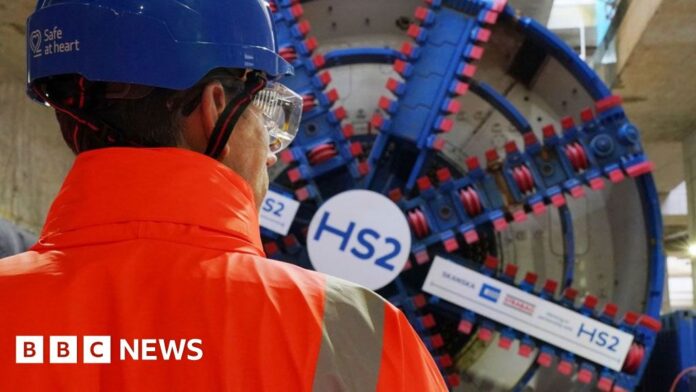The opening of HS2 will be delayed beyond the target date of 2033, the government has confirmed, but it did not say when the high speed railway line will begin operating.
Transport Secretary Heidi Alexander said on Wednesday that there was “no route” to delivering the line on schedule and within budget, describing the HS2 project as an “appalling mess”.
She said a “litany of failure” had led to missed deadlines and ballooning costs which rose by £37bn between HS2 being approved in 2012 and last year.
It is the latest setback for the high-speed rail project, which has been scaled back and delayed repeatedly.
Announcing the delay in the House of Commons, Alexander said: “It gives me no pleasure to deliver news like this.
“Billions of pounds of taxpayers’ money has been wasted by constant scope changes, ineffective contracts and bad management.”
She said she would provide an update on costs and deadlines before the end of the year.
Numerous Conservative governments presided over the rising cost of HS2.
Shadow transport secretary Gareth Bacon admitted that “mistakes were made in the delivery of HS2”.
He said that “costs more than doubled” and “the project has been repeatedly delayed”.
Bacon said that changes announced in 2023 under the then prime minister Rishi Sunak were the result of failures by the Conservative government with the scheme.
They included scrapping the plan to build the HS2 line between Birmingham and Manchester.
Alexander said that two reports into the project are intended to “draw a line in the sand” and mark a reset in how major infrastructure in the UK is delivered.
An interim report by Mark Wild, chief executive of HS2 who was appointed last year, “lays bare the shocking mismanagement of the project under previous governments,” said Alexander.
She added: “Based on his advice, I see no route by which trains can be running by 2033 as planned.”
Mr Wild’s interim report into the organisation he now leads found that there was “no single root cause” for rising costs and delays at HS2 Ltd but an “accumulation” of issues over time.
He said that there was a “lack of timely intervention to address known challenges which set the conditions for the systemic failure we see today”.
Mr Wild conceded that external factors had contributed to difficulties, including the pandemic, Brexit and the Russia-Ukraine war.
But there were other more persistent problems, he found.
Construction of HS2 started “too soon” without stable designs, Mr Wild said, meaning that costs and scheduling did not adequately take risks into account.
The organisation itself is “imbalanced” and “too big” in some areas, such as the corporate function, he said. There are also gaps in the workforce in particular people with commercial and technical skills.
A second report by senior infrastructure delivery specialist James Stewart looked into the governance and accountability of HS2 Ltd. It set out what has gone wrong with project and what ministers can learn for future major projects.
Alexander also confirmed the appointment of Mike Brown, the former commissioner of Transport for London, as the new chair of HS2.
Under the original plans, HS2 was intended to create high-speed rail links between London and major cities in the Midlands and North of England.
It was designed to cut journey times and expand capacity on the railways, but has faced myriad challenges and soaring costs in the 16 years since it was first proposed.
The massive construction project was given the green light in 2012, and was expected to cost £33bn and to be open by 2026.
By 2013, the cost of the project had spiralled to almost £50bn, with the expected completion date pushed back to 2033.
In 2020, when Boris Johnson recommitted the government to going ahead with HS2, one independent estimate put the potential eventual cost at £106bn.
In recent years, the scope of the development has been scaled back.
The eastern leg between Birmingham and Leeds was axed first, before Rishi Sunak’s government cancelled the planned Birmingham to Manchester route.
Last year, the Department for Transport said the remaining project cost was estimated at between £45bn and £54bn in 2019 prices – but HS2 management has estimated it could be as high as £57bn.



